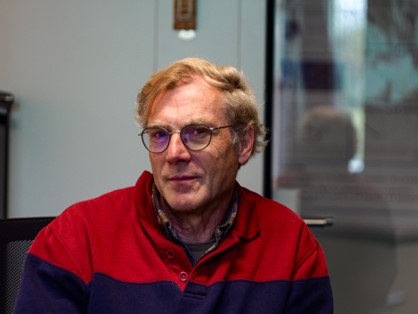Career Paths, Interview with Bert Kers
So just to start off the interview, what is your current occupation?
“Yeah, so officially I am —“
“What do you call it? Onderzoeksmedewerker, a research employee. And then the university has all kinds of classes. Class one, two, three, etc; I’m not even sure, I think class two.”
How do students know you?
“So I think that within the CIO, everybody knows me and that’s because of the safety tours. And then a lot of external students from other institutes, from Wageningen, Utrecht. Not just students, also PhDs and everything.”
And I assume also because of your atmospheric research?
“Yeah and for my atmospheric research. So, I started in the 1980s (1985) doing carbon-14 for archeology, and later on I did hydrology and oceanography. And then we moved from the center of town to Nijenborgh 4. There I also started to do atmospheric research. And so, I went from carbon-14, to stable isotopes and from stable isotopes to atmosphere. So officially, now I’m fully there for doing atmospheric research and atmospheric related whatever.”
How did you start your career?
“I studied chemistry. In Dutch we called it HBO Chemie at that time. Nowadays it’s the HLO. So that’s higher laboratory education. So after secondary school you have the MAVO and HAVO. I did the HAVO and then the higher education for chemistry. I studied chemistry laboratory as a laboratory technician. And then, at that time I had to do military service which was sixteen months. When I finished that I started looking around for a job. I looked everywhere in the whole country, it didn’t matter where. Except for Rotterdam, Amsterdam and The Hague. I didn’t want to go to the Randstad because I come from the east, from Twente. So the north or the south didn’t matter to me. Then luckily I was able to obtain a job here at the university. At first it was all temporary. First you have a contract for one year, then for the next. And in the end Harro (Meijer) organized that I could have a fixed contract. With a temporary contract you could not get a mortgage, with a fixed contract I was able to get a house.”
Which aspects of your job provide you with the greatest sense of fulfillment?
“Yeah, a lot of them do. I think the most important aspect is research. In my study time I did what we call a stage (an internship). You had to go do practice work at companies, but by then I already knew that commercial laboratories were nothing for me. Because that is first of all commercial and secondly that’s more about product quality. That is just the same thing every day, and after a long time that gets boring of course. So I started working for AKZO for half a year, at the research lab. And then I determined for myself that I wanted to do research. The university allows me to do that research, and that is just the best thing. As the university says: ‘You’re on the edge of knowledge.’ And every time that edge shifts a little, allowing everyone to keep on improving. Here in the laboratory you can see that happening with new equipment, new machines and new research subjects. That is the most beautiful thing about my job. And then of course all the people you meet. Especially students as they come and go.”
So you meet a lot of people, but how do you feel about networking?
“Well, to be honest, I’m very old fashioned so I don’t network online. I don’t have Facebook or LinkedIn, that stuff I don’t do. I don’t need it for my job. Nowadays, if you’re a student, you finished your studies and you want to find a job, you’ll need it. I go to congresses to see and meet people. That is my networking. In real life.”
Do you have any advice for future EES graduates?
“Now the nice thing that I experience is when students come to the laboratory here. Already in the beginning I have a pretty good feeling whether or not they will make it. What I see is that a lot of students here in the lab learn how to work with their hands. So, they will have to use tools and so on. And some people have two left hands, and very soon they go into modeling and things like that. But the most important thing is to look into your heart. If you want to be a technician then stick to that. But if that is not your thing, do something else that you do like. Whether that is modeling, electronics, or teaching. Just follow your heart.”

Bert Kers


Comments
Log in to read and post comments